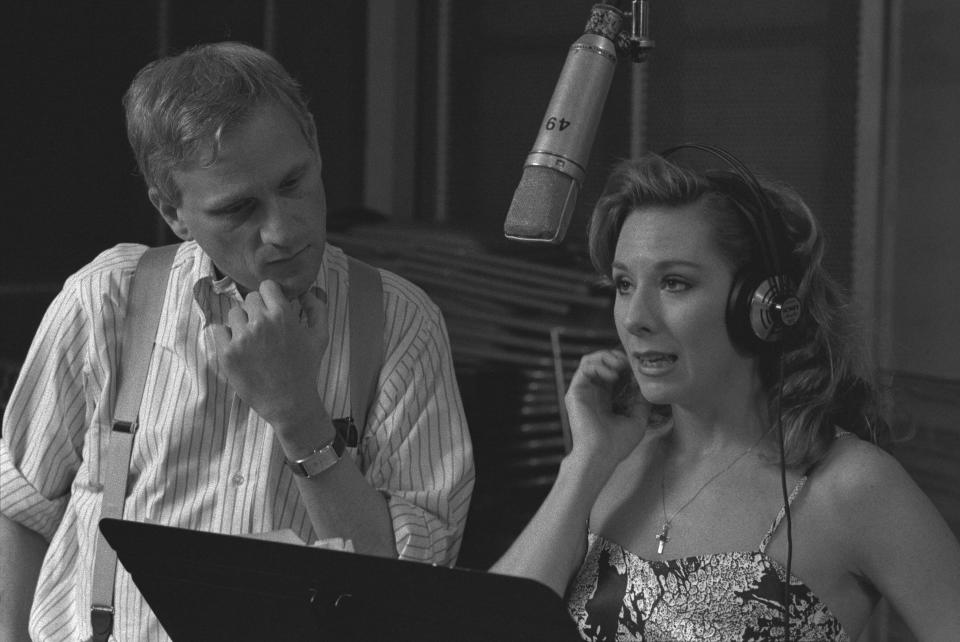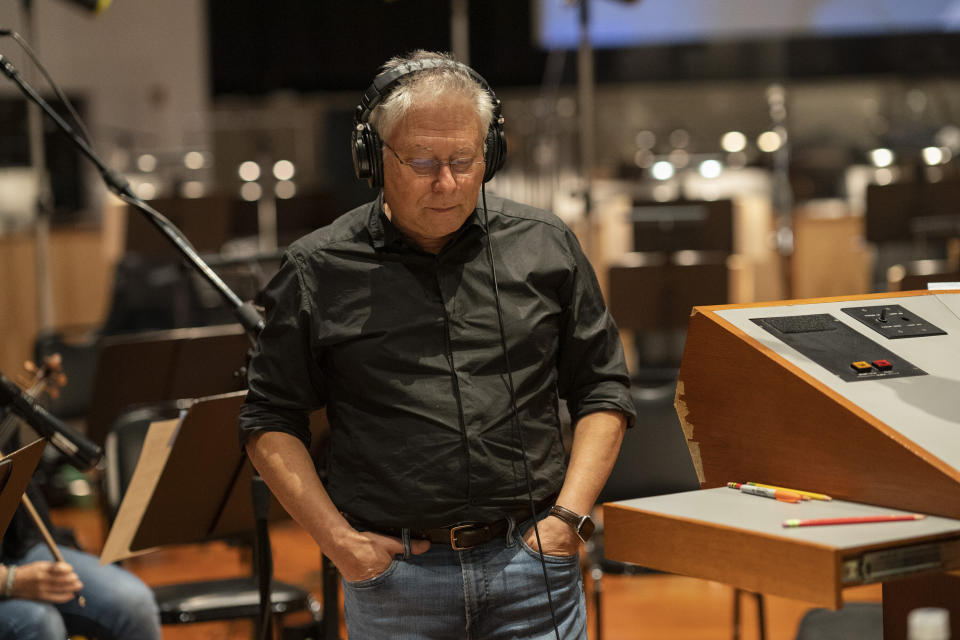Alan Menken On Losing Disney Lyricist Howard Ashman To AIDS: ‘It Was Crushing’

When the so-called Disney Renaissance began in 1989, much of its success could be attributed to two people: Alan Menken and Howard Ashman. Together, they wrote the music and lyrics for “The Little Mermaid,” “Beauty and the Beast” and “Aladdin,” capitalizing on a creative partnership that began with the stage musicals “Kurt Vonnegut’s God Bless You, Mr. Rosewater” and “Little Shop of Horrors.” Reaping the rewards of Ashman and Menken’s ingenuity, Disney entered a new period of cultural dominance that’s still thriving today.
But Ashman didn’t get to see the world embrace “Beauty and the Beast” or “Aladdin.” He died at the height of the AIDS crisis, in 1991, eight months before “Beauty” opened in theaters. The following year, Ashman won an Oscar — his second, having also received one for “Under the Sea” — for the title song. His romantic partner, Bill Lauch, accepted the award on Ashman’s behalf, extolling the “home and life” they’d shared together in front of a country that didn’t support LGTBQ rights.
Ashman’s legacy has been commemorated in the endearing documentary “Howard,” which was released on the streaming platform Disney+ last weekend. I first saw the movie two years ago when it premiered at the Tribeca Film Festival, after which I spoke to Menken by phone about his work with Ashman. Since Ashman’s death, Menken has composed music for “Pocahontas,” “The Hunchback of Notre Dame,” “Hercules,” “Enchanted” and several Broadway shows. He became an EGOT in July, collecting an Emmy for the Disney Channel series “Rapunzel’s Tangled Adventure.”
During our conversation, Menken described what it was like for him to see the Don Hahn-directed documentary for the first time, how his friend’s health affected their work and the projects Ashman never got to finish.
I’m sure you’re asked often to recount tales of working with Howard Ashman, and now you have this artifact to encapsulate your creative partnership together. What did you feel upon first seeing the movie?
Well, of course, I was actually scoring it as well. I saw it in various stages. So when I saw it completed, which was at the [Tribeca] premiere, it was extremely emotional. It was one of those things where it got to the point where I’d go, “Oh my God, am I going to have, like, a gut-level cry?” It equally just blindsided me with emotion, but that often happens with this particular topic of my collaborator. It’s unique to him and to the situation. It’s just a very deep place.
As a movie lover, the footage of the studio sessions from “Beauty and the Beast” and “The Little Mermaid” is phenomenal. Was this documentary the first time you had revisited that stuff?
I was coming back to them after years away from it. When “Mermaid” was being scored and shot, nobody knew that Howard was sick. Going back and visiting it again and watching it with that in mind adds a number of layers of perspective to that, as opposed to when we were doing “Beauty.” I knew then that he was sick, so I remember it being this emotional roller coaster of an experience being there. In another part of your brain, you’re going, “Oh my, what’s going on? Howard’s going to be gone.” Because there was no doubt about AIDS then, what it did.

Before seeing this documentary, I was unfamiliar with the theorizing about potential AIDS subtext in “Beauty and the Beast.” Is that something you were aware of when the movie was coming out?
No. It would humiliate the boy. I remember thinking it’s ironic. Howard never, ever, ever would have wanted to create an overt message in the storytelling commenting on something else. That’s just not the way Howard did it. However, as we all know, there are analogs throughout every story to things that are real. How much of that came through subconsciously is, I guess, apparent to us who watch it now. I think the passion with which Howard wrote this could have been affected by that. But if you go back to “Little Shop of Horrors,” Howard was not sick when we wrote that, and yet it was about a plant that thrives on the blood of humans. You go back and think, “Oh my God, it’s a metaphor.” But the fact is, it was just a story we were telling. Those parallels exist, whether we are conscious of them or not.
There was also the moment, which is excerpted in the movie, when Howard’s partner, Bill Lauch, said onstage, “This is the first Academy Award given to someone we’ve lost to AIDS.” It made me think about what popular culture did to heighten AIDS awareness at that exact moment. Tom Hanks won two years later for “Philadelphia,” Madonna was advocating for AIDS support and “Rent” opened on Broadway soon after that. What was your perspective on how Howard’s death was received?
We were in the bubble of the entertainment business, so we could not really feel much pushback at all. My perspective is, until Magic Johnson came out [as HIV-positive], people were able to categorize it as simply a gay epidemic. Whatever they imagined the behavior or habits of a gay person to be, they attributed it to that. Those of us who lived at the center of it knew that it was an uncontrolled wildfire of happenstance. I do know that the night of the “Beauty and the Beast” win, I mean, I was focused on missing Howard, God knows, but we were all so caught up in the adrenaline of the moment. And we were deep into working on “Aladdin” at the same time, and working on “Newsies” at the same same time. It was a period of such frantic creation. We almost didn’t have time to react, which maybe was a blessing.

Looking back at it, would you say Magic Johnson was the turning point for that movement?
That, and probably Ryan White [a teenager who contracted HIV from a contaminated blood treatment]. People just get very affected by those things. But the tragedy of AIDS was it hit such a young and vital part of our creative environment, in theater, in film, in all of the arts. You literally did not know who was going to be gone next. Some of our biggest figures now, you look and go, “Thank God they survived.”
Was Howard at all involved with putting down the first fingerprints on “Pocahontas”?
No, “Pocahontas” was well after Howard was gone. The one that Howard would have wanted to do but couldn’t do was “Newsies.” Howard was upset: “I can’t do this one, I don’t have the strength.” At that last period, as he was considering projects and knowing he couldn’t do them, that was probably the saddest time of all.
Were there other things that you guys brainstormed? Did you fantasize about what else you might have collaborated on if you’d had more time?
I remember there’s a story about Andrew Lloyd Weber asking to meet with him. I think at the time he was working on “Phantom of the Opera” and was considering Howard as a collaborator or lyricist. And Howard got himself together to take a car into the city to meet with Andrew. He got halfway into the city, looked down and realized he was still wearing his bedroom slippers, and it was humiliating. He got there, and he told me Andrew just pulled out a chair and said, “Can I get you a cup of tea?” He just looked at him with what must have been crushing pity. It was just devastating. Those things were very, very, very, very tough.
We always did our own demos, and he loved to do the voices. Then neuropathy hit, where we thought maybe it was just his laryngitis. But his voice never came back. It was crushing. And then every day was another one. It was just a downward slide of diminishment at a time where everything was just exploding in an upward direction.

What was it like for you to rebound, creatively speaking, from losing Howard as a partner at Disney?
It was a very rich period in terms of creativity, first with Tim Rice and Jack Feldman and Stephen Schwartz and David Zippel. For me, part of it was I was on that upward trajectory, and I was young and ambitious and I wanted to have a career. At the same time, I wanted to protect the integrity of Howard’s and my work, so I just stepped into the role that Howard had filled. I became, with all my collaborations, a much more dominant collaborator. It’s something I had ceded when I was working with Howard. But you just have to go on.
To give you another anecdote, the day Howard died, I was getting all my travel plans together to have the first recording session for “Newsies.” It was not movable, so I flew out to L.A., did the session and got back on a plane that took me back to Baltimore. Basically we buried Howard, had a funeral, then I flew right back out to L.A. to continue work on “Newsies.” It was just, there was no way to breathe. And my feeling has been that, on a soul level, Howard has remained with me very, very viscerally in dreams and thoughts. And I’m not being metaphorical about this. I do think he’s been a part of my life ever since he passed.
One more thing before you go. I love this little morsel in the documentary: Were you familiar with the script that Howard was writing with Tina Turner before he died?
I knew about it, yeah. It was “I, Tina.” There were three things that I knew of that he went to the studio and talked about. There was “I, Tina,” there was a live-action “Thief of Bagdad” and [there was] “Little Mermaid.” He leapt at “The Little Mermaid.” He wanted into animation.
And do you know what came of the Tina Turner script?
Yeah, it became “What’s Love Got to Do With It.”
This interview has been edited for clarity and length.
Love HuffPost? Become a founding member of HuffPost Plus today.
Related...
Better With Age: The Holland Taylor Story
40 LGBTQ Directors On The First Queer Movie They Fell In Love With
How ‘Welcome To Chechnya’ Designed New Technology To Document Queer Persecution
Also on HuffPost
This article originally appeared on HuffPost and has been updated.

 Yahoo News
Yahoo News 
